This article relies largely or entirely on a single source .(February 2024) |
Movies and documentaries in which Paul Robeson has either starred, narrated or been featured and those that were film projects he was involved.
This article relies largely or entirely on a single source .(February 2024) |
Movies and documentaries in which Paul Robeson has either starred, narrated or been featured and those that were film projects he was involved.
| Year | Title | Role | Director | Producer |
|---|---|---|---|---|
| 1925 | Body and Soul [1] | Reverend Isaiah T. Jenkins / His brother Sylvester | Oscar Micheaux | Micheaux Film Corporation |
| 1926 | Camille | Himself (cameo) | Ralph Barton | Warner Bros. Pictures |
| 1930 | Borderline | Pete Varond, a Negro | Kenneth MacPherson | The Pool Group |
| 1933 | The Emperor Jones | Brutus Jones | Dudley Murphy | Gifford Cochran |
| 1935 | Sanders of the River | Bosambo | Zoltán Korda | Alexander Korda |
| 1936 | Showboat | Joe | James Whale | Carl Laemmle Jr. |
| 1936 | Song of Freedom | John Zinga | J. Elder Wills | H. Fraser Passmore |
| 1937 | Big Fella | Banjo | J. Elder Wills | British Lion Films Corporation |
| 1937 | King Solomon's Mines | King Umpoba | Robert Stevenson | Gaumont-British |
| 1937 | My Song Goes Forth | Himself (Narrator) | Joseph Best | Ambassador Films |
| 1937 | Jericho/Dark Sands | Jericho Jackson | Thornton Freeland | Capitol Films |
| 1938 | Canciones de Madrid | Himself (Documentary) | Juan Manuel Plaza | Estado Mayor, Comisariado del Ejército del Centro |
| 1940 | The Proud Valley | David Goliath | Pen Tennyson | Ealing Studios |
| 1942 | Tales of Manhattan | Luke | Julien Duvivier | Boris Morros |
| 1942 | Native Land | Narrator | Leo Hurwitz and Paul Strand | Leo Hurwitz and Paul Strand |
| 1954 | Das Lied der Ströme/ The Song of the Rivers | Narrator/Song | Joris Ivens | DEFA (GDR) |
| Year | Title | Role | Director | Producer |
|---|---|---|---|---|
| 1977 | The Tallest Tree in Our Forest | Himself | Gil Noble | Gil Noble |
| 1979 | Paul Robeson: Tribute to an Artist | Himself | Saul J. Turell | Jessica Berman and Saul J. Turell |
| 1998 | Paul Robeson: Speak of Me as I Am | Himself | Rachel Hermans | BBC Wales/New Jersey Public Television |
| 1999 | Paul Robeson: Here I Stand | Himself | St. Clair Bourne | Chris Schultz |
| Year | Title | Involvement | Problem | Status |
|---|---|---|---|---|
| 1934 | Black Napoleon | Paul Robeson was reportedly attached to this 'historical drama' about Toussaint-Louverture, liberator of Colonial Haiti. | The film was to be directed by Sergei Eisenstein and he and Robeson discussed the idea at length during Robeson's first trip the Soviet Union in December 1934. Boris Shumyatsky, the Soviet head of film had it listed in the export catalogue of Intorgkino, the USSR's international film source. | film never made |
| 1936 | Oliver Law Film | Robeson wanted to do a bio-pic on the African American communist, labor organizer, and social activist, Oliver Law who fought with the Abraham Lincoln Brigade after hearing about his heroism during the Spanish Civil War. | Robeson was unable to find the financial backing saying that the "Motion Picture industry, and so refuse to allow such a story," preferring to profitable films of "mediocre entertainment." | film never made |
| 1958 | Othello Film | Robeson was reportedly going to finally bring his renowned portrayal of Othello to the big screen in a Soviet backed production. | Robeson fell ill before pre-production commenced and he had other artistic commitments to fulfill once he was well again.. | film never made |
| 1959 | The Blacks | Robeson was considered for the lead role in the film version of the comedy play The Blacks by the French dramatist Jean Genet. | Robeson and his wife/manager, Eslanda Cardozo Goode, reviewed the film script and declined. | film never made |
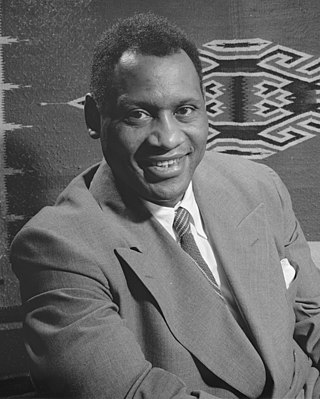
Paul Leroy Robeson was an American bass-baritone concert artist, actor, professional football player, and activist who became famous both for his cultural accomplishments and for his political stances.
The Peekskill riots took place at Cortlandt Manor, New York in 1949. The catalyst for the rioting was an announced concert by black singer Paul Robeson, who was well known for his strong pro-trade union stance, civil rights activism, communist affiliations, and anti-colonialism. The concert, organized as a benefit for the Civil Rights Congress, was scheduled to take place on August 27 in Lakeland Acres, just north of Peekskill.
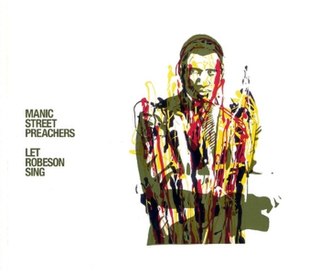
"Let Robeson Sing" is a song by Welsh alternative rock band Manic Street Preachers. It was released in September 2001 by record label Epic as the fourth and final single from their sixth studio album, Know Your Enemy. It reached number 19 in the UK Singles Chart.
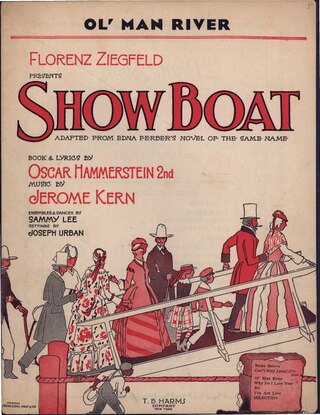
"Ol' Man River" is a show tune from the 1927 musical Show Boat with music by Jerome Kern and lyrics by Oscar Hammerstein II, who wrote the song in 1925. The song contrasts the struggles and hardships of African Americans with the endless, uncaring flow of the Mississippi River. It is sung from the point of view of a black stevedore on a showboat, and is the most famous song from the show. The song is meant to be performed in a slow tempo; it is sung complete once in the musical's lengthy first scene by the stevedore "Joe" who travels with the boat, and, in the stage version, is heard four more times in brief reprises. Joe serves as a sort of musical one-man Greek chorus, and the song, when reprised, comments on the action, as if saying, "This has happened, but the river keeps rolling on anyway."

Roy Ottoway Wilkins was an American civil rights leader from the 1930s to the 1970s. Wilkins' most notable role was his leadership of the National Association for the Advancement of Colored People (NAACP), in which he held the title of Executive Secretary from 1955 to 1963 and Executive Director from 1964 to 1977. Wilkins was a central figure in many notable marches of the civil rights movement and made contributions to African-American literature. He controversially advocated for African Americans to join the military.
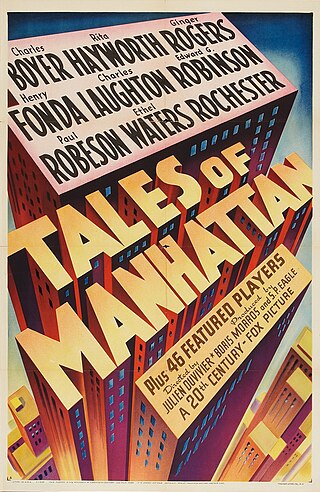
Tales of Manhattan is a 1942 American anthology film directed by Julien Duvivier. Thirteen writers, including Ben Hecht, Alan Campbell, Ferenc Molnár, Samuel Hoffenstein, and Donald Ogden Stewart, worked on the six stories in this film. Based on the Mexican writer Francisco Rojas González's novel, Historia de un frac, which he was not credited for, the stories follow a black formal tailcoat cursed by a cutter as it goes from owner to owner, in five otherwise unconnected stories.

The Proud Valley is a 1940 Ealing Studios film starring Paul Robeson. Filmed in the South Wales coalfield, the principal Welsh coal mining area, the film is about a seaman who joins a mining community. It includes their passion for singing as well as the dangers and precariousness of working in a mine.

The Emperor Jones is a 1933 American pre-Code film adaptation of Eugene O'Neill's 1920 play of the same title, directed by iconoclast Dudley Murphy, written for the screen by playwright DuBose Heyward and starring Paul Robeson in the title role, and co-starring Dudley Digges, Frank H. Wilson, Fredi Washington and Ruby Elzy.

Sanders of the River is a 1935 British film directed by the Hungarian-British director, Zoltán Korda, based on the stories of Edgar Wallace. It is set in Colonial Nigeria. The lead Nigerian characters were played by African Americans Paul Robeson and Nina Mae McKinney. The film proved a significant commercial and critical success, giving Korda the first of his four nominations for Best Film at the Venice Film Festival.
Paul Robeson: Tribute to an Artist is a 1979 American short documentary film directed by Saul J. Turell. In 1980, it won an Oscar at the 52nd Academy Awards for Documentary Short Subject. It was released alongside Robeson's other films on a Criterion Collection box set in 2007.

Paul Leroy Robeson Jr. was an American author, archivist and historian.
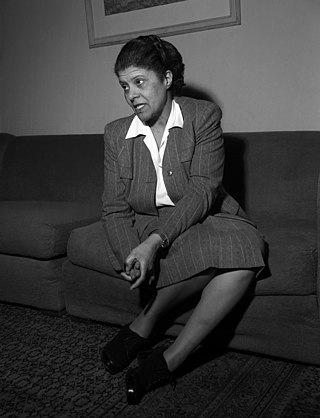
Eslanda "Essie" Cardozo Goode Robeson was an American anthropologist, author, actress, and civil rights activist. She was the wife and business manager of performer Paul Robeson.
Big Fella is a 1937 British musical drama film directed by J. Elder Wills and starring Paul Robeson, Elisabeth Welch and Roy Emerton. It is loosely based on the novel Banjo by Harlem Renaissance writer Claude McKay.
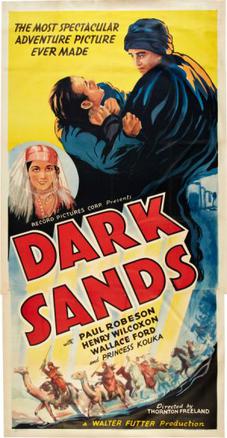
Jericho is a 1937 British drama film directed by Thornton Freeland and starring Paul Robeson, Henry Wilcoxon and Wallace Ford. It was released in the US with the alternative title Dark Sands.
Native Land is a 1942 docudrama film directed by Leo Hurwitz and Paul Strand.
The Tallest Tree in our Forest is a 1977 documentary film directed and written by Gil Noble, about singer, actor and activist, Paul Robeson. It was shot on 16mm film and was started shortly before Robeson's death at age 77 in 1976. The film features rare archival footage, interviews, and still photography from the twentieth century. The title is taken from a 1940s statement made by Mary McLeod Bethune describing Paul Robeson. The film was originally available in a three-part format for use on public-access television channels and in classrooms for ages fourteen and above.
Paul Robeson: Here I Stand is a comprehensive and award-winning documentary film that explores the life and career of Paul Robeson, the controversial African-American athlete-actor-singer-activist. It was directed by St. Clair Bourne for the PBS series American Masters. Spanning Robeson's whole life, it features interviews with Robeson himself, his son Paul Robeson Jr. and others close to its subject, celebrities, and several scholars on African-American cinema. It also includes extensive excerpts from Robeson's movies and musical recordings.
My Song Goes Forth, is the first documentary about South Africa as apartheid was being imposed. The film features singer, actor and civil rights activist Paul Robeson singing the title song and adding a prologue that asks the viewers to interpret the remainder of the film against the producer's intentions. Alternately entitled "Africa Sings", the initial purpose of the film was as a pro-white supremacy short-subject documentary which serves as an advertisement for the birth of apartheid in South Africa but with a conflicting message in the voice-over. Primarily the documentary has been associated with Robeson and early Anti-Apartheid activism due to his re-editing and rewriting of the films' narration.

The Paul Robeson House was the home of internationally renowned American bass-baritone concert singer, actor of film and stage, All-American and professional athlete, writer, multi-lingual orator, human rights activist, and lawyer Paul Robeson from 1966 until 1976. Located in West Philadelphia, the Robeson House produces, presents and promotes traveling lectures, concerts and exhibits so that learning about Robeson is accessible to all ages and cultures.